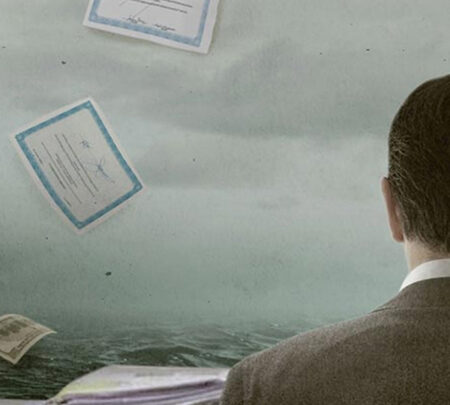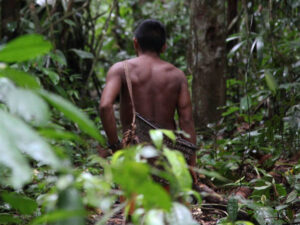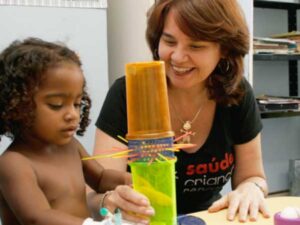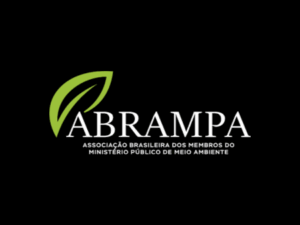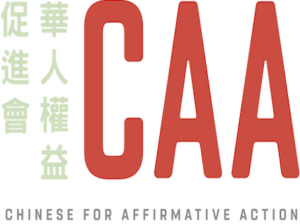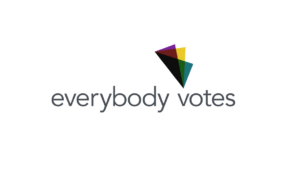Hundreds of investigative reporters, editors, and technologists are exposing organized crime through the Organized Crime and Corruption Reporting Project. “It takes a network to fight the network,” says co-founder Paul Radu. Collaborations with other organizations such as Transparency International are increasing efficiency and impact.
Paul Radu of the Organized Crime and Corruption Reporting Project spoke with Ruth Terry on March 16, 2023. Click here to read the full conversation with insights highlighted.
Ruth Terry: Could you please introduce yourself and your organization?
Paul Radu: I am Paul Radu and I’m the co-founder of the Organized Crime and Corruption Reporting Project, OCCRP.
Ruth Terry: Can you describe the problem that your organization addresses and how you’re responding to it? And maybe you can tell me a little bit about the background of the organization, too.
Paul Radu: The Organized Crime and Corruption Reporting Project, as the name suggests, is a journalistic organization focused on investigating large scale global organized crime and corruption. We are a platform of investigative reporters where we mix technology and reporting with very high journalistic standards to be able to expose crime and corruption in the public interest. The problem is that organized crime, especially transnational organized crime, operates across many frontiers, operates globally, operates at a level where you have no natural enemy against them. If you look at the law enforcement side, law enforcement is always national. It’s always confined to the nation state’s borders so there’s a territory where there’s no enforcement, where there’s no scrutiny or there’s very little scrutiny and that’s where we are operating as OCCRP. We work with brave journalists all over the world on six continents right now.
We investigate how crime and corruption works with the goal to stop them from doing business as usual, with the goal of stopping criminals from harming citizens, from destroying democracy, and from destroying many other things like livelihoods and the environment, because organized crime is something that’s very toxic. It’s global and it’s ruthless. All the way from Mexico to Europe to Africa, to North America, you see the same organized crime group operating with impunity. You hear here and there that there have been arrests or some goods were seized from these people, but it’s too little. It’s too little and it’s very late. It’s up to investigative reporters to fill in for this void and to be a counter force to organized crime.
We work with hundreds of investigative reporters, we work with many editors, we work with technologists because we understood very early on that it takes a network to fight the network. We are trying to fight this network across not just physical borders, but also digital frontiers because obviously, you have a lot of organized crime that’s spilled into cyber worlds. We try to mix field reporting with advanced investigative strategies, digital investigative strategies and so on, to be able to provide the public with as full as possible a picture of what is going on. What do they have to guard against and how can they take some measures to protect themselves and to protect democracy in general? There’s always this high level connection between organized crime, transnational organized crime, and corrupt politics in many countries. There’s various layers there, but usually, when you have a crooked regime, when you have politicians that are really interested in destroying democratic processes because they want to preserve their power, what you usually find behind those politicians is criminals.
Sometimes the politicians are working directly with the crime groups, but in many cases, the crime groups use the politicians to achieve their goals and their goals are simple: to rob as much as possible, to hurt as much as possible, because to them, the world’s populations are just victims. This is where we’re trying to bring our contribution across sectors. We are not just investigative reporters, we are also technologists. We build software, we build systems to allow citizens to be very active when it comes to the investigative processes because at the end of the day, I’m very proud of our work, but if you look at the global investigative reporting industry and there’s not more than 15,000 people doing this type of work. That’s like a very small town, 15,000 people. The problem is much greater than 15,000 people.
We have to engage a lot more people with these kinds of efforts. We need to be a lot smarter about the technology that we are using, keeping in mind that the people that we are exposing are very powerful and they have lots of resources. You take just one Mexican drug group, let’s say the Sinaloa Group or the Jalisco Group, every year their budget is somewhere around $100 billion dollars. These are huge, huge amounts. With that kind of money, they can buy politicians and they can do a lot of damage. What we’re seeing more and more is that these groups are operating across borders. They are in the US, they are obviously in Mexico, they’re in Colombia, they are in Europe. For the past decades, they’ve kept spreading and building up their networks.
Unfortunately for us investigative reporters, we only started collaborating a bit more than 10 years ago and that’s a very short period of time. Not only that, we are also too few to do this work, and there’s still hiccups here and there. Organized crime have built their networks for decades, so we are trying to catch up using technology and building alliances. For instance, one of the most efficient steps that we’ve taken was a few years ago when we founded a digital alliance between OCCRP and Transparency International where we do the investigative part, we expose, but in the process we collaborate with Transparency International so that when we publish the stories, Transparency International can go out with their advocacy.
This works on many levels and it’s been a little bit controversial at first because you obviously have to keep the lines between investigative reporting and activism, but we found ways to cooperate without tainting the investigative process, without exposing ourselves to activism as investigative reporters. That’s an alliance that we are calling the Global Anti-Corruption Consortium. Now, we co-opted in more organizations with these types of efforts because when you go across sectors it increases your efficiency manyfold. Our alliance with Transparency International increased our efficiency about four times. Before the alliance, we were doing really good work, putting articles out, making a little bit of noise here and there, and then after a short time, it would die down a bit and maybe there would be some impact here and there.
Transparency [International] picks up what we have exposed and they go much wider than we can. They have lawyers that are very skilled, they have activists, they have people who know what they’re doing, and these people can expose our data and our findings in a much better way than we can by putting out articles or podcasts or films and all that. That’s, I think, where we’re really innovative. But again, the problem to solve is much bigger than a bunch of investigative reporters going at organized crime because it’s really something that’s global and it’s something that needs a solution, and we found a partial solution to. But we need to learn more and we need to collaborate more in order to understand how we can be even more efficient in what we do.
Ruth Terry: How did you get started with this? What was your path to organized crime? That’s very specific investigative reporting.
Paul Radu: I’m from Romania, from a part of Romania called Transylvania. Since I was a kid in the early 90s, I saw that there was quite a bit of crime around me, as it was all over the former eastern bloc after the fall of communism. I think that influenced me a bit because I was trying to understand what was going on, why? In the early 90s, I witnessed the fact that the Italian mafia started working quite heavily in my country, and they’ve done quite a bit of damage. There were local groups that started forming at the time and there was always an intersection between the former socialist-communist regime and the new organized crime that popped up in the country because you could see the same people were cooperating to make money. In the very early 2000s, I was studying in Slovakia and I was living in the same apartment with a Slovak guy, a Lithuanian guy, and someone from Hungary. We realized, although we are from the same region, we don’t know much about each other, about each other’s country. That’s when we decided, “Hey, let’s build this Pan European Center for Investigative reporting.” We never did that, it was just an idea at that point in time, but it was an idea that stuck in my head and I started applying for fellowships. At some point in the early 2000s, I was a fellow at the Institute for Human Sciences in Vienna studying crime because I realized that I have to understand what’s going on.
After the fellowship, I was interviewing criminals who were jailed in various countries to ask them why they were doing what they were doing, and how, and what was their reasoning behind that. That was a very interesting experience as a young journalist at the time, because it showed me that these people were working, and were networking across borders. I remember meeting a trafficker who was selling humans, buying and selling humans in Bosnia and Herzegovina. This guy knew a lot more about trafficking in my own country, in Romania, than I did. And at the time, I was investigating crime and corruption. I realized how much criminals cooperate and collaborate across borders, how they build these networks, and why they have this sense of impunity because, again, they operate at a level where they have no enemy. Even this guy, he was in jail, but I met him outside of this jail because every month he was allowed to leave jail for four days for his good behavior. He was still running his business, so there was no actual harm done to him at all. Very slowly, I started understanding a little bit more speaking with more criminals, and you get to a point, as an investigative reporter focused on organized crime and corruption, where you realize that crime and corruption is the same all over the place. You investigate a criminal scheme in Hungary and then you realize that it’s the same as the criminal scheme in Peru because criminal models are imported and exported across borders. That’s where I, together with my co-founder Drew Sullivan, thought we have to do something about it because we are investigating the same thing over and over again. We have to be smarter than just going case by case. We started thinking a bit bigger and thinking about how to investigate the infrastructure that allows for this exchange of criminal models that allowed the criminals to align themselves across borders and to go for the kill sometimes.
We started doing these projects where we looked at the infrastructure of organized crime. In the process, we founded OCCRP a bit more than 15 years ago. We had our 15 year anniversary in August last year. We started designing technology that is meant to be useful to investigators, for journalists to be able to identify crime and corruption across borders, because again, we understood that there are many patterns in it. Once you isolate the patterns, you can be more efficient in identifying the crime and you can augment and enhance your network so that other journalists in other countries can use and apply what you’ve already done in their own environment to expose crime and corruption.
There were instances when we would expose a criminal group in Eastern Europe and then they would vanish from Eastern Europe. Some of them would get caught, would be convicted and so on, but many wouldn’t. They would just move to Africa and they would continue to do the same rampage that they were doing in Europe. Our idea was, we can’t allow them to operate anywhere on earth, so we worked with African journalists to expose these people and to actually stop them from doing business as usual. The whole idea is to shrink the criminal playground as much as possible.
Ruth Terry: I love this parallelism between what you observed in how criminal networks work and how they function with this infrastructure and with this networking and the fact that that’s like, “Okay, well, that’s the response that we need to have. It can’t just be individual stories or an individual product.” It’s like, “Let’s have this network.” Would you say that makes your approach distinctive among other efforts? You mentioned there’s maybe 15,000 people doing this kind of investigative journalism. Would you say that sets you apart?
Paul Radu: I think that this is unique on the side of OCCRP, because we started this type of work early on and we engaged with many other investigative outlets. For instance, we work quite a lot with the International Consortium of Investigative Journalists (ICIJ), the organization behind the Panama Papers, and we’ve done the Panama Paper side in Eastern Europe, the Russia side and all that. We realized you have to build these networks, you have to operate across borders. The times of the low-north journalists are long gone because you can’t be efficient in that way. What makes us unique is our focus, because media in general, if you take the investigative newsroom of a newspaper, let’s say, or of a TV station, they will investigate various types of issues at the same time. Sometimes they would follow up on some of the issues and that’s great, but myself and Drew, we realized we have to keep a focus on crime and corruption because they evolve so much and so fast. In order to be efficient against it, you have to keep this focus and build on your previous reporting. You can’t jump from story to story without any relation between them because then you lose a little bit of the focus.
This is why we build technology that’s focused on crime and corruption. Everything we did was focused on this issue. Now, this being said, when you investigate crime and corruption, you actually realize that you investigate everything because, for instance, in the past years we’ve created an environmental department at OCCRP because we saw that when we investigated a criminal group, say a criminal group from Colombia, that they would always damage the Amazon or they would always have some operations in the Andes.
We tried to build in this component where we said, “Well, this is not just about the money that’s stolen, this is not just about the lives that are hurt directly through drug trafficking and kidnappings and ransom, but it’s also about the environment being greatly hurt in the process.” We started seeing a lot more around these criminals because once they amass large wealth, they become what I call criminal angel investors. Criminal angel investors are people who are going to try to get as much political power as possible. That means they will try to corrupt from a local government to a central government to a national government and so on, but they will also try to create more crime around them because, and this is something that I also learned by speaking with criminals quite a bit, this is a lifestyle for them. It’s not just a way to make a quick buck here and there. It’s not something that can stop just like that. There’s very few criminals who retire. Usually, crime is for life and you do it because it’s the way you want to live your life. Once these people amass wealth and a lot of power and political power, they will want more and more and more. When you see these transnational groups being behind extremism in many countries, trying to form war, trying to form conflict, trying to do as large scale damage as possible to be able to not just conserve their power, but actually increase their power.
Ruth Terry: Can you share an example that illustrates the impact of your work? Who’s the direct beneficiary and do you have maybe a story that shows how they’ve benefited?
Paul Radu: OCCRP has contributed to the recovery of about $10 billion from corrupt corporations, from organized crime and other corrupt parties. What this means is that over 15 years, we’ve exposed this type of behavior and Transparency International was able to pick up some of it or law enforcement picked it up and it resulted in money ceased, in many arrests, and people’s political careers being cut short and so on. With each of our investigations, we try to help the public recover as much of these funds that were stolen from public budgets and try to clip the wings of really bad parties who, again, are trying to destroy people’s lives. With each of these, we are following the money and we’re following the behavior of these people.
For instance, together with our partners in Sweden, we investigated a case that’s called TeliaSonera. TeliaSonera is a very big telecom company in Europe, and they were operating in Central Asia. We proved that they were paying a lot of bribes to local politicians that were very corrupt there. As a result, TeliaSonera was fined a few €100 million in Europe and similarly in the US. This money was seized from these people and some of it was returned to the people in Central Asia. That’s one example of the impact that we can have together with our allies. This is not just OCCRP, this is OCCRP and partners because we believe in collaboration and it’s the only way to have this type of impact.
We’ve investigated oligarchy and kleptocracy quite a bit. As a result of our investigations, lots of money has been seized from these people and some of these people ended up behind bars in various countries. One series of investigations that I’m very proud of are our investigations on the banking systems. We’re seeing right now, for instance, Credit Swiss, which is one of the oldest Swiss banks and one of the largest banks in the world, is having a lot of trouble because last year we exposed that they had a very toxic business model where they catered to lots of corrupt politicians and criminals. We’ve exposed many banks, we exposed quite a few in Europe and beyond, and this led to changes in the way banks go about their due diligence, the processes when they check where the money comes from.
For too long, banks were accepting money from various parts of the world without asking questions and it happened that a lot of that money was stolen from the people in those countries. We had a series of investigations that we called The Laundromats. We had the Russian Laundromats, we had Azerbaijani Laundromat, we had the Troika Laundromat and so on, where we exposed hundreds of billions in theft that was done via very large banks, sometimes all the way from Russia to Europe to the US to South America. There are many investigations and we publish more than 100 investigations a year and these are deep investigations, it’s a big volume. We’re generating the most investigative reporting in the world right now as an organization when it comes to crime and corruption.
Even if we’ve investigated and contributed to the recovery of this much money, the problem is still there because what we’re doing is a proof of concept. The amounts should be much larger. The volumes that we’re putting out of information should be much larger for the citizens to be able to make decisions based on those. Again, I’m very proud of our work, but we need to up our game and we need to collaborate with a lot more people. We’re building a blueprint of how you can affect organized crime and shrink their territory, but it’s ultimately all about scaling this up as much as possible and optimizing the processes as much as possible.
I’ll give you an example. We have a system that’s called Aleph, our main investigative tool when it comes to digital investigations. In Aleph, we have about 34 terabytes of data, all types of data including registries of companies worldwide, databases on court cases from all over the world and so on. The power of Aleph is that you can put in it a list of all the members of the parliament in a country and the system will search those names against all the data that’s indexed there and will spit out results that you can follow up with the proper investigative process. It’s a very powerful tool, but the problem is we have a lot of data and a lot of data keeps on coming in. There’s a lot more public data, there’s a lot more leaks, there’s a lot more of all types of information and we are paying a lot of money just for processing and indexing this data. We’re paying more than $20,000 every month to Google and to others to use their clouds. This is becoming more costly for us because with each five terabytes that we’re ingesting, the prices go up by at least $2,500 a month per five terabytes.
I believe in five to 10 years, we’ll have to have at least 500 terabytes in order to be efficient with this system. That raises the problem not just of the cost, but also of tuning our technology for this type of data and investigative processes and the way we interact with the public in a way that will make the public more a part of the investigative process. I think that’s really key. The public will need the help of as much technology as possible. This is a bit of a cat and mouse game because obviously, the criminals use a lot of technology, many of them are very early tech adopters and they have resources and all that.
Criminals cooperate with other criminals and they use these criminal service industry lawyers, accountants, hackers. We have a lot more at our disposal in civil society, we have groups that operate with a lot of data. For instance, if you look at healthcare, you have all sorts of universities and hospitals working with enormous amounts of data. We can learn from all those operations. We need their help. What we have on our side is lots of smart people with a lot of goodwill. As journalists, we can always operate and work as connectors between worlds with the knowledge that there’s lots of other people out there that are much smarter, but we can bridge their knowledge so that we create a force for good that may be more successful in the future.
Ruth Terry: What are some insights or teachable lessons from your work that you would offer to others? What advice would you give for someone who wants to, if not do exactly what you’re doing with investigative reporting, just manage such a wide network of partners in an effective way or work internationally in an effective way?
Paul Radu: I think it’s really important to always be open to ideas and to understand that people are all different. That’s really key. It sometimes takes quite a bit of time to understand the cultural differences, to understand what’s possible in a country, to understand what is not possible, and to really give room to people who join your organization to express themselves because that’s where you find innovation. You find a local initiative that maybe was not very successful at the local level, but then the same ideas, when you apply them at a regional or global level, are a wild success because those people just needed the right environment to apply their ideas. I think being open and trying to understand that this is a network where everybody needs to grow.
I also believe it’s very important to always focus on a goal, and our goal as investigative reporters is to serve the public interest. That’s it. Now, as long as you keep this focus and as long as you tune your work towards that, things will happen with hard work. When you work with someone who’s new with your network, who’s from a country where you’ve never worked before, where you’ve never been before, it’s really important to listen and to understand because everybody has a lot to offer. Once you understand that and you try to explain the network that you’ve already built to the new arrivals in a way where they feel welcome and they feel that they can use the potential of the network as a place where they can really grow and do something amazing, that’s where good things start happening.
There’s a lot of fun in this work. Just as in the case of the criminals, investigative reporting becomes a lifestyle. In terms of managing the network, I think the other advice, and we learned it the hard way, was that you start with a lot of enthusiasm and it’s all great and you’re suddenly a small, medium size organization, but then, when you grow much larger, you have to put some form to it. You have to hire people who know how to manage a network, who know how to work the finances, who know how to do things that you are not able to, who know how to do fundraising. You have to put more structure in the network for the network to last, but at the same time, you have to keep some of the initial experimentation and the spirit that this is a place where things are not settled. This is a place where you have dialogue, where you have arguments, where you have everything with this idea in the back of your mind that it’s all in the public interest.
Ruth Terry: Every social innovator learns a lot from things that didn’t work. Is there a lesson you learned the hard way that maybe you can share that could maybe help people facing the same challenges?
Paul Radu: At the end of the day, there’s trial and error in everything and sometimes we make errors, sometimes others make errors. I think building trust is the hardest thing, and I can give my own example. When I was a very young journalist, I was living in Slovakia and studying organized crime, and I met this journalist who was also a member of the ICIJ at the time, this was more than 20 years ago. To me, this guy seemed really good because he was a member of this prestigious investigative reporting network and I went to him because I also wanted to become a member of the ICIJ, and I did a little bit later in 2003. But what I didn’t know was that the guy was actually working for the local Secret Service and he was a very toxic person. As a result of my interactions with him, I got kicked out of the country. There was a lot that happened and I only learned years later that it was because of him when he published a book saying he was an agent. Later on, he worked with a very toxic business guy in Slovakia who’s behind the killing of journalists, Ján Kuciak and Martina Kusnirova. They were assassinated a few years back and we’ve actually done a film on that and we continue their work. So you have to give people the benefit of the doubt and you have to be as open as possible, but you also have to keep in mind that trust is built over time. There’s no trust that can be gained instantly. In most cases, trust needs to be built over collaborations, over real work, over real interactions so that you can really trust someone with your data and many times, with your life.
Ruth Terry: A couple times during this interview you brought it to a really human place and a really individual place. What do you need from other actors and partners to continue to advance systems level change in the way you are? And where do you see your work going in the next five years?
Paul Radu: We’re very much struggling with this. We’re actually meeting soon to devise our strategies for the next three years, five years and 10 years. Our previous five-year strategy is going to be done by the end of this year and we’ve probably achieved about 80% of what we had in mind five years ago, which is not that bad. The world is changing with the new technologies, with AI, we’re seeing with GPT-4 right now, and it’s just amazing. We don’t just have to increase our numbers as proponents of investigative reporters and as editors, and not just to augment the technology that we’ve already developed, but we have to tweak many of our processes and learn from others how they build their domains to be future-proof, in a way.
For me, I would be happiest if everyone on Earth would be an investigator in their own right. When I’m saying this, I’m saying that I hope there’s going to be a time where there’s not going to be a need for investigative reporting because everybody will have the tools, will have the know-how, will have everything at their disposal to be able to investigate and distinguish between this is, “Fake news,” or, “a false type of information,” or, “This is someone who’s trying to steer me that way or that way.” That’s where I believe we use our current work as proof of concept, as a blueprint for the future, but a blueprint that can serve people and can serve other sectors to build their own investigative capacity in a way that serves them and that serves the public at large so that they can shield themselves from harm.
Sometimes you investigate a supply chain and you realize it’s not just that there’s crime and corruption that’s destroying that supply chain or tainting it, but it’s also a lot of incompetence. It’s a mixture of corruption that’s sometimes not even a corruption that’s perceived by the people that are in the midst of it. Raising awareness will not just help people make decisions in their own interest, but also help them not become part of very toxic supply chains where they don’t even know that they’re used for something that’s not good for the rest of the world.
We need to rethink how investigative reporting contributes to this ultimate goal to inform citizens and to contribute to citizens becoming a little bit more aware of global issues, a little bit more aware of how their lives locally are influenced by something that happens far away and how they can in turn help those processes so that those other people far away are not hurt because some kleptocrat stole the money from an African country or from a European country and came to their neighborhood in Miami to invest the money and everybody in Miami is happy, “Oh, there’s more money in my community,” but without thinking, “Wait, but this money is actually toxic money and at some point in time, the criminals will do the same here in this neighborhood that they’ve done before in their other neighborhood.”
We need to create more investigative strategies together with other groups, with other areas. That’s why I’m always for collaboration across sectors because the more minds that come together to think about the systems and about how we can enhance our abilities to prevent climate change, and how to influence the human link processes in a way that people are served by their politicians and not robbed by their politicians. There’s a lot of work to do and this work can only be done, I believe, with journalists as connectors between various fields, science, the economy, and so on, and with journalists sharing and being as open as possible and as transparent as possible so that people see that this work is in the public interest and not some hidden or obscure type of stuff.
The more transparency we embed with our processes while keeping in mind that we need to protect whistleblowers, we need to protect sources. It’s a bit of a tightrope, but I think it’s a tightrope that becomes wider and wider and much easier to walk for many other people. We need to widen it enough so that people can make something with the tools we have, and completely change what we’re doing for the better.
Click here to read the full conversation with insights highlighted.
Ruth Terry is an award-winning social impact writer based in Istanbul, Turkey, with bylines in Al Jazeera, BBC Travel, National Geographic, NBC Think, The New York Times, The Washington Post, Time, and more. Writing across topics and genres, she has covered everything from race to roller skating through a lens of social justice and equity.
* This interview has been edited and condensed.
Learn about what’s working in social innovation.

